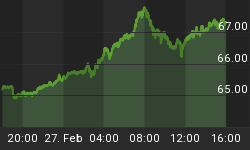Muammar Gadhaffi's 42 year-old regime is in its death rattle - maybe today, maybe tomorrow, his administration that has ruled Libya with a quixotic and brutal hand is about to pass, in Trotsky's piquant phrase, "into the dustbin of history," prompting the question "what next?"
The glittering prize is Libya's 1.6 million barrels per day output of high quality crude, which accounted for about 2 percent of global oil output drawn from Africa's largest oil reserves, whose exports have been stymied since the NATO-led campaign began six months ago. Projecting into the future, analysts believe that has reserves to sustain its previous level of production for 80 years.
Who will eventually control this asset, with oil prices currently at roughly $84 a barrel, generating an income of more than $12.6 million per day?
Italy's ENI?
France's Total?
Britain's BP?
U.S. companies?
Or, will China add Libyan future production to its string of acquisitions, as it is already China's eleventh largest source of imports?
The crystal ball is murky indeed, but when the uprising against Gadhaffi began six months ago, according to the Chinese media, about 36,000 Chinese were in Libya working on 50 projects.
Cautiously accepting the new reality, Chinese Foreign Ministry spokesman Ma Zhaoxu said in a statement posted Monday on the ministry's website, "The Chinese side respects the choice of the Libyan people. The Chinese side is willing to work with the international community to play a positive role in the reconstruction process of Libya in the future."
The key word here is "reconstruction," a noun conspicuously absent from any statements by the NATO coalition members.
When the uprising against Gadhaffi began 75 Chinese companies had already invested billions of dollars in Libya in infrastructure projects, including oil, railway and telecoms projects. After the insurrection erupted in February China began a substantial land, sea and air evacuation operation of its nationals.
Benghazi-based Libyan rebel oil firm Arabian Gulf Oil Co. (AGOCO) information manager Abdeljalil Mayouf cautioned however that China's "softly, softly" approach to the uprising may initially cost it influence in the new Libyan reality, saying, We don't have a problem with Western countries like the Italians, French and UK companies. But we may have some political issues with Russia, China and Brazil."
While many analysts believe that Italy's ENI and France's Total could be successful in post-insurrection Libya because of their countries' heavy support for the rebels, it may all devolve down to a question of funding, and given Beijing's pockets, despite its caution in its foreign policy, that may well give China the edge.
Few promoting the prospects of Italian and French energy firms now remember that just a couple of months ago the Libyan dissidents were literally begging for financial assistance.
Furthermore, particularly in African endeavors, Chinese investment has extended far beyond mere resource acquisition to providing infrastructure essentials such as roads, schools and health clinics, all of which will be in short supply in post-Gadhaffi Libya.
Finally, certainly last but not least, China has no history of colonialism in North Africa, unlike Libya (occupied by Italy, 1911-1947), Tunisia (France, 1883-1956), Algeria (France, 1830-1962), Morocco (France, 1906-1956) and Egypt (Britain, 1882-1922.) While such issues are not fiscally tangible, they may well influence the post-Gadhaffi negotiations.
Waiting in the wings are U.S. and Canadian companies such as Marathon, ConocoPhillips, Hess, Occidental and Suncor, which withdrew Libya at the onset of insurrection, as well as Russian companies, including oil firms Gazprom Neft and Tatneft, which had projects worth billions of dollars in Libya alongside Brazil's Petrobras. BP, which did not have production in Libya before the war, said it was planning to return for exploration efforts.
In the coming weeks Libya's National Transitional Council will doubtless be inundated with offers from various companies promoting their advantages. Total and ENI have the inside geographical edge, being across the Mediterranean, while American and British companies have cutting edge technology to refurbish Libya's decrepit energy infrastructure.
But it is too early to count China out from the race - they do not come burdened by history, and they come with deeper pockets than all their competitors. The NTC, if it indeed represents the Libyan people, will not be unswayed by such concerns, as the European rivals have yet to utter the one of the words most dreaded on Wall Street in considering profits, "reconstruction." Whatever the shortcomings of Beijing's views of events in Africa's largest oil producer, they do extend beyond mere corporate profits to include rebuilding, which is likely to ensure them a place at the table.
Source: http://oilprice.com/Energy/Crude-Oil/Libyas-Post-Gadhaffi-Future-Who-gets-the-Oil.html
By. John C.K. Daly of OilPrice.com















